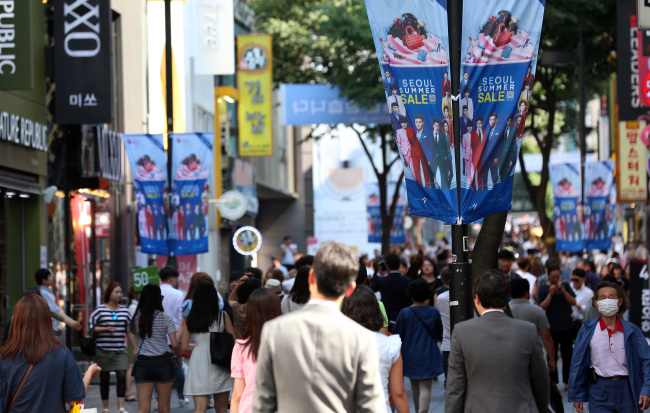The Middle East respiratory syndrome outbreak in South Korea continued to show signs of abating Wednesday as no additional cases were reported for the fourth straight day and more patients recovered from the deadly disease.
Health authorities reported no deaths and no additional cases Wednesday, keeping the death toll at 33 and the fatality rate at 18.1 percent. Meanwhile, two more patients were discharged from hospitals. The recovered patients accounted for 53.3 percent of all 182 infected individuals as of Wednesday.
Among the 97 recovered patients, the largest number of them -- 25.8 percent -- are in their 40s, followed by those in their 50s and 60s. Meanwhile, the largest number of the deceased patients were in their 60s and 70s, followed by those in their 80s and 50s.
 |
Seoul’s shopping district Myeongdong, once affected by the MERS outbreak, is filled with visitors on Wednesday. (Yonhap) |
Health authorities are still closely monitoring seven medical facilities as potential MERS patients remain in quarantine. Cases could still be identified at these facilities, they said.
Since Tuesday, a number of news reports have claimed that Samsung Medical Center in southern Seoul, where 87 patients were infected, allegedly did not cooperate with the government’s request to investigate their facility on May 29, nine days after the index case was confirmed on May 20.
The hospital is also where the index patient was diagnosed with MERS officially.
Quoting an anonymous Health Ministry official, the reports claimed three government investigators were physically blocked by the hospitals’ security guards, despite their investigation being scheduled in advance. Samsung Medical Center, one of the top hospitals in Seoul, has denied all accusations.
By Korean law, those who refuse to cooperate with or who interrupt the government’s investigation can face a fine of 2 million won ($1,800).
Kwon Deok-cheol from the Health Ministry’s MERS response headquarters said there appeared to be some discrepancies in the reports and that the authorities would look further into the issue.
“We believe that the officer who was quoted in the story was not one of the three investigators who visited the hospital on May 29, but an officer who knew the three investigators,” he said. “We will have to speak to the three officers to find out what exactly happened. Once we do that, we’ll share that information.”
In the earlier stages of the outbreak, the Health Ministry had been accused of holding on to information about cases that occurred at Samsung Medical Center, owned by Samsung Group, in its effort to protect the facility and its business.
The government had refused to share the list of MERS-affected hospitals for the first 18 days since the index case was confirmed on May 20.
The ministry also did not confirm the nation’s 35th case, a health care worker who contracted the virus from the 14th patient at Samsung Medical Center, until three days after his official diagnosis.
The MERS outbreak has also revealed the nation‘s poorly equipped medical facilities for infectious diseases. On Monday, the ministry announced that it is to expand the coverage of national health insurance for patients with contagious diseases, as well as the costs of building the negative room pressure system and safety gear for health care workers.
As some of the current administration‘s key pledges were to introduce more welfare benefits especially for the large elderly population, the government has been putting less emphasis on the nation’s public health sector.
The Ministry of Health and Welfare‘s budget for its welfare programs increased dramatically by 20 trillion won -- 82 percent -- from 2010 to this year, from 23.93 trillion won to 43.44 trillion won. However, its budget for the public health programs only increased by 1 trillion won in the same period.
By Claire Lee (
dyc@heraldcorp.com)








![[Today’s K-pop] Blackpink’s Jennie, Lisa invited to Coachella as solo acts](http://res.heraldm.com/phpwas/restmb_idxmake.php?idx=644&simg=/content/image/2024/11/21/20241121050099_0.jpg)